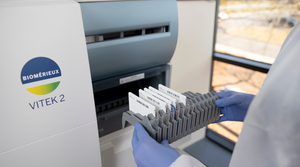Will Digital Medicine Replace the Clinician?
One of clinicians' greatest fears is that they'll be rendered obsolete by new technology. Could it really happen?
November 13, 2015
Ben Torres

The fear of being replaced pierces right through the heart of technology-resistant clinicians, generating notions that something like the Skynet will somehow terminate healthcare providers and replace them with robots that provide patient care. But I would argue that this is nothing more than a misconception. Perhaps it exists due to provocation from investor Vinod Khosla, who stated that technology would replace 80% of doctors. Or perhaps it could simply be apprehension brought on by the onslaught of the healthcare changes taking place. Whatever the poison, the question shouldn’t be “Will technology replace the clinician?” The question that instead should be asked is “How will technology change the clinician?”
The Perioperative View
The emergence of remote monitoring and wearable technologies is showing the potential to dramatically impact clinical decision-making by giving clinicians new insight into what goes on in a patient’s daily life. Without these technologies, clinicians could only progress their patients or make their prescriptions based on what they could see in person or in the clinic. This creates a silo effect, where clinicians become so focused on their area of expertise that they make decisions from isolated positions. But with remote monitoring technologies, clinicians can actually track a patient’s progress based on factors that occur outside the clinic and lead to decisions that are much more accurate and meaningful to the patient’s life.
Take musculoskeletal rehab, for example. There are innovations being made in exercise and rehab that are giving postacute care specialists such as physical therapists the ability to remotely analyze, identify, and count how a patient is moving as well as how compliant they are being to their home exercise programs. As a result, clinicians will be able to accurately determine if the exercises they are doing at home are having a positive impact on their progress or if other issues need to be addressed.
An Emphasis on Communication
There is little doubt that technology will have a strong influence on the process of care and how clinicians practice. Digital medicine will be able to perform several medical procedures that have traditionally been under the umbrella of the clinician. Because of this, a clinician’s judgement, the ability to make sense of the data presented, and the willingness to communicate effectively with patients will now be at the forefront of patient care. Dr. Eric Topol explained it quite well when discussing clinicians and algorithms:
Because so much can be processed automatically, through artificial intelligence, the need for the processing will be reduced on the physician's side. On the other hand, the humanistic compassion, communicative judgment, and experience [of providers] is going to be emphasized all the more.
As to the process of care, the adoption of new technologies and value-based payment models by hospitals will place greater demand on a healthcare provider’s ability to reduce readmissions and decrease overutilization of treatments and tests. This again emphasizes the need for clinicians to communicate well and deliver excellent outcomes. A recent study revealed hospital readmissions, on average, can be reduced by 5% if hospitals prioritize communication with patients.
The Patient Experience
Ultimately, it comes down to the patient experience. And perhaps there is none more impactful at delivering this than telemedicine. Companies such as Vsee and American Well are delivering solutions that allow clinicians to communicate with patients from far distant locations. Undeniably, this makes seeing the healthcare provider much more convenient, especially if a patient has to travel 30 or more miles to wait two hours in the lobby for a follow up appointment that lasts less than 10 minutes. And for the clinician, this is a solution that can potentially clear up the waiting room for patients that would be in greater need of an in-person clinic visit. This would make the practice of medicine more efficient for both the clinician and patients that may only need a follow up check in.
I would argue that the presence of digital medicine in the healthcare industry is a direct result of how clinicians have practiced in their given environment. Like any other environment, healthcare can only take on so much waste and inefficiency until Mother Nature eventually takes it course. In healthcare’s case, it evolves to new models of care and adoption of digital technologies. But in no way can this imply a replacement of the human connection that is supposed to exist between clinicians and patients. Rather, its existence actually serves to strengthen it and to allow the relationship between the two to take place without the barriers that can often lead to fragmented care.
This is not to say that the replacement of a healthcare provider will not happen; it most certainly may. But the clinician will not be replaced by the emergence of technology. Instead, the clinician, by failing to adapt, will be replaced by another clinician—one that has the full command of both technology as well as the human connection.
Don't miss the BIOMEDevice San Jose conference and expo, December 2-3, 2015 at the San Jose Convention Center. |
Ben Torres is a clinical specialist and accounts manager for Reflexion Health, a digital medicine startup based in San Diego.
[Image courtesy of STOCK IMAGES/FREEDIGITALPHOTOS.NET]
You May Also Like

